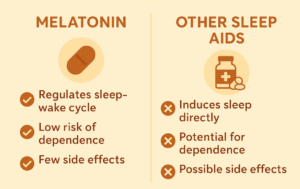Is Melatonin the Safest Sleep Supplement?
 Walk into any pharmacy or browse the wellness aisle online, and you’ll see melatonin supplements prominently displayed as a go-to solution for sleep. But is melatonin really the safest sleep supplement? The answer is nuanced.
Walk into any pharmacy or browse the wellness aisle online, and you’ll see melatonin supplements prominently displayed as a go-to solution for sleep. But is melatonin really the safest sleep supplement? The answer is nuanced.
What Melatonin Actually Does
Unlike sleeping pills that sedate the brain, melatonin is a time signal. It tells your body that it’s night, nudging your circadian rhythm into alignment. In that sense, melatonin doesn’t force sleep—it sets the stage for sleep to arrive naturally.
Why Melatonin Is Considered “Safe”
-
Natural Origin: It’s a hormone your body already produces, peaking at night.
-
Non-habit forming: Unlike benzodiazepines or “Z-drugs” (zolpidem, zopiclone), melatonin doesn’t cause dependence or withdrawal.
-
Mild Side Effects: When they occur, they’re usually limited to morning grogginess, headache, or vivid dreams.
-
Short-Term Use: Safe for adults when used for jet lag, shift work, or short bouts of insomnia.
Where Caution Is Needed
-
Children: Can be safe for certain conditions (autism, ADHD), but always under medical supervision.
-
Long-Term Use: Safety data for years-long use is limited. Older adults may benefit, but the lowest effective dose is best.
-
Quality Control: Supplements vary widely in purity and dose accuracy, especially in markets without strict regulation. Some tablets may contain much more (or less) melatonin than the label claims.
-
Drug Interactions: Melatonin can interact with blood thinners, immunosuppressants, diabetes medications, and others.
How It Compares to Other Sleep Aids
-
Antihistamines (e.g., diphenhydramine): Common in “PM” medications, but cause morning grogginess, dry mouth, constipation, and tolerance with repeated use.
-
Herbal remedies (e.g., valerian root, chamomile, ashwagandha): Evidence is mixed. Generally safe, but not as well studied as melatonin.
-
Prescription sleep medications: Effective for short-term severe insomnia but come with higher risks—dependence, memory problems, falls in older adults.
-
Magnesium or L-theanine: Considered safe and sometimes helpful, though their sleep effects are milder and more supportive than direct.
Practical Guidelines
-
If you’re otherwise healthy and need short-term help adjusting your sleep schedule, melatonin is among the safest first options.
-
Use low doses (0.3–3 mg) rather than high ones, timed 30–90 minutes before bedtime.
-
Remember: melatonin helps more with sleep timing (jet lag, delayed sleep phase) than with sleep maintenance insomnia.
-
For chronic or severe sleep problems, evaluation by a doctor is always wiser than self-medicating indefinitely.
Bottom Line
Melatonin is one of the safest sleep supplements available, especially compared with sedatives and over-the-counter sleep aids. But “safe” doesn’t mean universal or foolproof. Think of melatonin as a gentle nudge to your body clock, not a cure-all. Used thoughtfully, it can be an ally in better sleep.
About the Author
I’m Dr. Srinivas Rajkumar T, MD (AIIMS, New Delhi), Consultant Psychiatrist based in Chennai. Through my clinical practice and writing, I aim to make psychiatry more understandable and less intimidating.
📍 Mind and Memory Clinic, Apollo Clinic, Velachery, Chennai (Opp. Phoenix Mall)
📞 +91 85951 55808
🌐 srinivasaiims.com